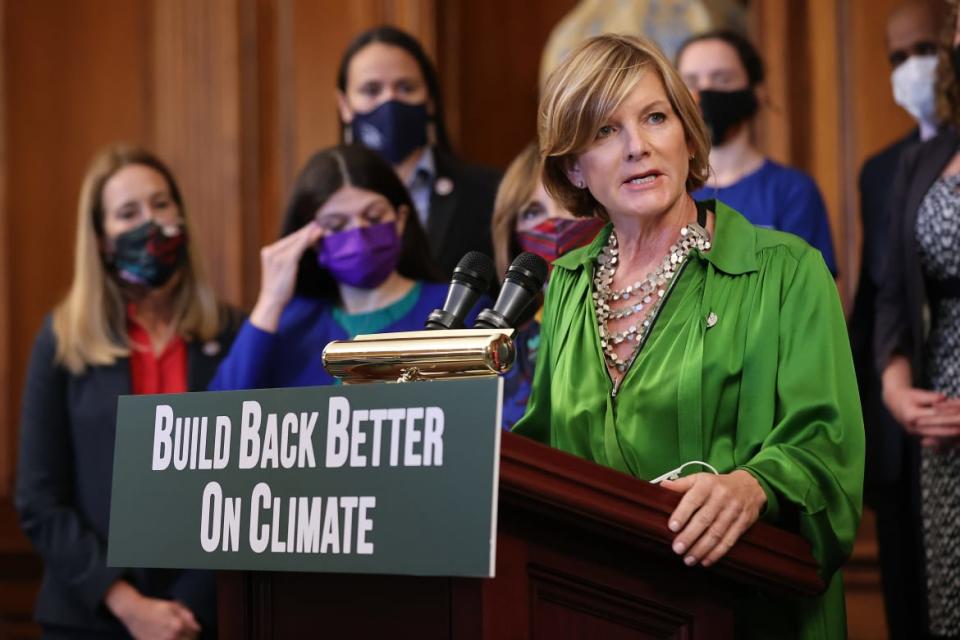Casino Tied to Dem Congresswoman Wants to Keep Its COVID Loan Money

- Oops!Something went wrong.Please try again later.
In the year since COVID-19 dealt the gambling industry an awful hand, many companies have seen their luck improve.
That’s proven to be good news for Rep. Susie Lee, a Nevada Democrat—politically as well as personally.
Last year, Lee notched a major win for her Las Vegas-area district by successfully pushing for casinos to gain access to the federal Paycheck Protection Program, which doled out loans to businesses hit hard by the pandemic.
That move in turn extended a lifeline to Lee and her family. Full House Resorts—a gaming company run by Lee’s husband that the congresswoman personally has a direct financial stake in—applied for and received millions of dollars worth of those loans, The Daily Beast reported in June 2020.
Nevada Congresswoman Pushed for COVID Loans for Casinos. Her Husband Got Two.
Full House has recovered nicely since then. But in a new twist, the casino is now arguing that taxpayers should pick up the full tab for the $5.6 million government-backed cash infusion that kept them afloat.
According to a new report filed to the Securities and Exchange Commission, the company said it applied for loan forgiveness to the Small Business Administration and believes it will qualify.
If so, Uncle Sam would be granting a windfall to a business whose value on the New York Stock Exchange has tripled from pre-pandemic levels. And this spring, the company—which operates five resort properties in Nevada, Colorado, Mississippi, and Indiana—expanded one of its Colorado properties with a $3.4 million purchase that included a “boutique hotel.”
That windfall would save Full House’s shareholders a good chunk of change. And Lee herself is a major shareholder in the company: in her most recent official financial disclosure form, she reported millions of dollars of stock and stock options in the company, stored in a variety of investment accounts.
In May 2021, Lee announced that she and her husband, Daniel, were getting divorced. Her August 2021 financial disclosure lists a number of jointly held investments in Full House, but also a stake of at least $1 million—and as much as $5 million—of stock in the company that is solely owned by her.

Rep. Susie Lee advocates for action on climate change during an event with House Democrats in September.
Lee’s office told The Daily Beast last year that she was aware her husband’s company applied for PPP loans, but that she was uninvolved in business decisions.
In response to questions for this article, a spokesperson for Lee said the congresswoman “is not involved in any aspect of Full House’s business or decision making. She had no influence over the decision to file for PPP loan forgiveness, and, of course, has no say over whether or not that application is approved.”
Full House did not respond to an emailed request for comment.
Lee is just one of roughly a dozen members of Congress tied closely to businesses that took PPP loans. Car dealerships owned by three Republicans—Reps. Roger Williams (R-TX), Vern Buchanan (R-FL), and Mike Kelly (R-PA)—each got PPP loans, for example. A law firm that Rep. Matt Cartwright (D-PA) formerly worked at, which currently employs his wife, also got loans.
Plenty of candidates for office have also benefited from the program, including Lee’s likely Republican opponent, April Becker, who herself operates a gambling business that received over $600,000 in PPP loans in 2020 and 2021. Becker has criticized President Joe Biden for “socialist spending,” referring to the $1.9 trillion, Democrat-backed American Rescue Plan that extended the pandemic loan program Becker’s businesses utilized.
Congress Helped Their Businesses During the Pandemic. Then They Attacked the Capitol.
Members of Congress and their family members are allowed to apply for and receive PPP loans. Millions of businesses nationwide were able to obtain those funds—as of May 2021, the federal government gave out nearly $800 billion in loans to 10.7 million borrowers—and there is nothing to suggest that lawmakers were treated any differently.
But ethics watchdogs have commented that it doesn’t look good for members of Congress to directly or indirectly benefit from a program like this, which they crafted and voted to create.
The case of Full House also illustrates some of the broader criticisms of the pandemic loan program, a massive government effort that was stood up in a matter of weeks as COVID ravaged U.S. businesses.
The PPP was primarily designed as a lifeline to small businesses with fewer than 500 employees and few options to stay afloat. “It is unlikely that a public company with substantial market value and access to capital markets will be able to make the required certification in good faith,” the SBA said when it rolled out the program.
But those companies nevertheless found ways to get PPP cash. The government’s rules allowed subsidiaries of larger companies to apply; Full House was one of many companies to take advantage of that rule.
Larger businesses not only got PPP loans but have found success in getting them forgiven, too. According to NBC News, 157 companies with access to stock market capital had $300 million worth of loans forgiven, out of a total of $610 billion that borrowers have requested to be forgiven. Their investigation also found that $120 million worth of loans have been forgiven for companies that are performing better now than they did before COVID, like Full House.
Asked about the example of Full House, Brandon Brockmyer of the Project on Government Oversight said, “It’s important for SBA to carefully consider whether to approve forgiveness applications, to make these decisions free from undue influence, and to be transparent with the public about their process.”
Get our top stories in your inbox every day. Sign up now!
Daily Beast Membership: Beast Inside goes deeper on the stories that matter to you. Learn more.

